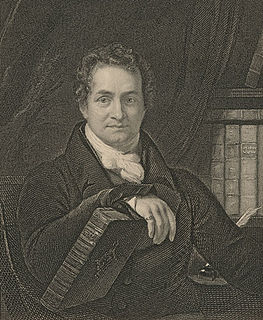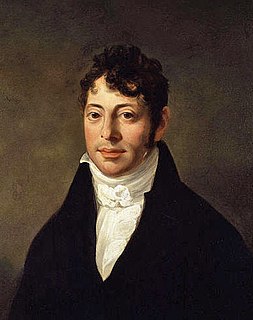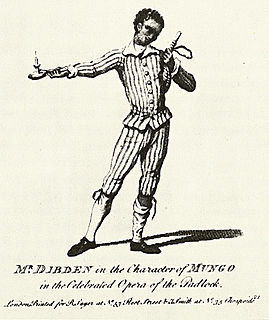
Charles Bannister (1738–1804) was an English actor, comedian and singer.

Thomas Frognall Dibdin was an English bibliographer, born in Calcutta to Thomas Dibdin, the sailor brother of the composer Charles Dibdin.

Charles Dibdin was an English composer, musician, dramatist, novelist and actor. With over 600 songs to his name, for many of which he wrote both the lyrics and the music and performed them himself, he was in his time the most prolific English singer-songwriter. He is best known as the composer of "Tom Bowling", one of his many sea songs, which often features at the Last Night of the Proms. He also wrote about 30 dramatic pieces, including the operas The Waterman (1774) and The Quaker (1775), and several novels, memoirs and histories.
Thomas John Dibdin was an English dramatist and songwriter.
Bibliomania can be a symptom of obsessive–compulsive disorder which involves the collecting or even hoarding of books to the point where social relations or health are damaged.
An afterpiece is a short, usually humorous one-act playlet or musical work following the main attraction, the full-length play, and concluding the theatrical evening. This short comedy, farce, opera or pantomime was a popular theatrical form in the 18th and 19th centuries. It was presented to lighten the five-act tragedy that was commonly performed.
Michael Dibdin was a British crime writer, best known for inventing Aurelio Zen, the principal character in 11 crime novels set in Italy.

Joseph Grimaldi was an English actor, comedian and dancer, who became the most popular English entertainer of the Regency era. In the early 1800s, he expanded the role of Clown in the harlequinade that formed part of British pantomimes, notably at the Theatre Royal, Drury Lane and the Sadler's Wells and Covent Garden theatres. He became so dominant on the London comic stage that the harlequinade role of Clown became known as "Joey", and both the nickname and Grimaldi's whiteface make-up design were, and still are, used by other types of clowns. Grimaldi originated catchphrases such as "Here we are again!", which continue to feature in modern pantomimes.

The ballad opera is a genre of English stage entertainment that originated in the early 18th century, and continued to develop over the following century and later. Like the earlier comédie en vaudeville and the later Singspiel, its distinguishing characteristic is the use of tunes in a popular style with spoken dialogue. These English plays were 'operas' mainly insofar as they satirized the conventions of the imported opera seria. Music critic Peter Gammond describes the ballad opera as "an important step in the emancipation of both the musical stage and the popular song."

Charles Benjamin Incledon was a Cornish tenor singer, who became one of the foremost English singers of his time, especially in the singing of English theatre music and ballads in which he was considered without rival.

The Padlock is a two-act 'afterpiece' opera by Charles Dibdin. The text was by Isaac Bickerstaffe. It debuted in 1768 at the Drury Lane Theatre in London as a companion piece to The Earl of Warwick. It partnered other plays before a run of six performances in tandem with The Fatal Discovery by John Home. "The Padlock" was a success, largely due to Dibdin's portrayal of Mungo, a blackface caricature of a black servant from the West Indies. The company took the production to the United States the next year, where a portrayal by Lewis Hallam, Jr. as Mungo met with even greater accolades. The libretto was first published in London in 1768 (?) and in Dublin in 1775. The play remained in regular circulation in the U.S. as late as 1843. It was revived by the Old Vic Company in London and on tour in the UK in 1979 in a new orchestration by Don Fraser and played in a double-bill with Garrick's Miss In Her Teens. The role of Mungo was, again, played by a white actor. Opera Theatre of Chicago have recently revived the piece (2007?) where, it would seem, the role of Mungo was changed to that of an Irish servant.

The Archdiocese of Malta is a metropolitan archdiocese of the Latin Rite of the Catholic Church in Malta.

The West Street Chapel is a former chapel at 26 West Street, London WC2. It was John Wesley’s first Methodist chapel in London's West End.
The Sans Souci Theatre was a 500-seat theatre located on Leicester Place, just off Leicester Square in the City of Westminster. It was built in 1796 by Charles Dibdin, and replaced eponymous former music rooms he had leased for performances, off the Strand.
In theater and music history, a burletta is a brief comic opera. In eighteenth-century Italy, a burletta was the comic intermezzo between the acts of an opera seria. The extended work Pergolesi's La serva padrona was also designated a "burletta" at its London premiere in 1758.

The siege of Tripoli occurred in 1551 when the Ottomans besieged and vanquished the Knights of Malta in the Red Castle of Tripoli, modern Libya. The Spanish had established an outpost in Tripoli in 1510, and Charles V remitted it to the Knights in 1530. The siege culminated in a six-day bombardment and the surrender of the city on 15 August.
George Dibdin Pitt was an English actor, stage manager and prolific playwright, specializing in melodrama. He was the first playwright to dramatize the fictional character Sweeney Todd, in his 1847 play The String of Pearls; or, The Fiend of Fleet Street.

Charles Isaac Mungo Dibdin, or Charles Pitt or Charles Dibdin the younger, as he was professionally known, was an English dramatist, composer, writer and theatre proprietor. He was perhaps best known for his proprietorship of the Sadler's Wells Theatre and for the pantomimes and satirical farces that he wrote, and which were staged at many theatres across London. He employed Joseph Grimaldi at Sadler's Wells where Grimaldi appeared in many of his most successful pantomimes. He was the son of Charles Dibdin, brother of Thomas John Dibdin and godson of David Garrick.
Harriet Pitt was a British actress and dancer.

Family Quarrels is a comic opera in three acts with a libretto by Thomas Dibdin, and music principally by William Reeve. It was premiered in London at Covent Garden Theatre on December 18, 1802. The singers John Braham and Charles Incledon had leading roles in the opera, in which the comedian John Fawcett took the part of the pedlar Proteus.











